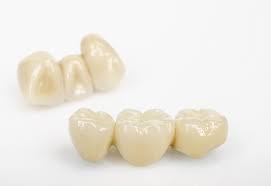Crowns and bridgework are often used to salvage the teeth during dental accidents or emergencies. If you’ve chipped or cracked a tooth, then a dentist may determine a crown is the best option in order to save the tooth from further damage. Bridgework, on the other hand, is necessary when you’ve lost a tooth. Below we will explain the difference between crowns and bridgework, so you have an idea of what you may need:
Crowns Explained
A crown is an artificial covering that can save a tooth while strengthening it. You may need a crown if you broke your tooth or wore it down. The most common way that people wear their teeth down is through clenching or grinding their teeth when they are stressed. Bruxism often occurs while a person is sleeping, so you may not be aware you grind your teeth until more noticeable problems show up like a cracked tooth or pain in your jaw. Crowns can also be used for decaying teeth, root-filled teeth, and large fillings. They will help prevent your teeth from worsening.
Bridges Explained
If the entire tooth is missing, you will need a bridge to fill the missing space. Don’t procrastinate on getting a bridge because your teeth will start to shift in an attempt to make up for the missing tooth. This can result in numerous problems, such as, spaces between the teeth and deterioration of the other teeth. A bridge redistributes the biting load, so that your remaining teeth don’t deteriorate while compensating for the missing tooth.
As you can tell, the difference between crowns and bridges is easy to understand. Crowns are coverings that attach to the top of the tooth to prevent it from deteriorating further, and bridges are custom devices that fill the space a missing tooth leaves behind. Whether you’re in need of a crown or bridge, don’t delay in seeing a dentist because you risk losing a tooth or suffering from more dental damage as your teeth take on a load that’s too heavy for them when you bite or eat.
Schedule an appointment with us today to see if you need a crown or bridge to improve your dental health. It could save you a lot of pain in the future.
